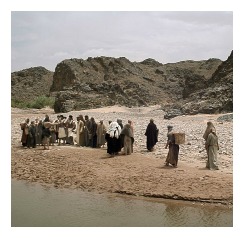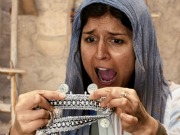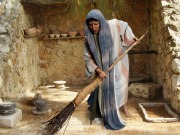Parable Of The Lost Sheep
Lesson 4.04
The parable of the lost sheep and the parable of the lost coin are the perfect lessons on the heels of the lost son parable. God loves us and wants us safely in his secure arms.
Please read Luke 15:1-10 before beginning free Bible study lessons #4.04.
Previous Lesson: Parable Of The Prodigal Son #4.03.
Preliminary Bible Study Questions:
1. Who is Jesus' audience in the Luke 15 parables?
2. Who is the main object of God's affection in these parables?
3. The two parables use what things to represent lost sinners?
Defining "lost sinner" would be a good starting point for this lesson.
A lost sinner is a person whom God has chosen for eternal life, but who has been deceived by the world's powers. He or she has followed the enticements of the world and grown apart from God and his ways. The allure of sin has captured the heart and soul of the person and he is outside the safe and loving confines of God's will.
Is this you or someone you love? Let's study these wonderful stories, starting with the parable of the lost sheep.
Parable Of the Lost Sheep Setting

Jesus Christ was in the midst of a Jewish audience, including common people and some Pharisees and Scribes. He was telling the common people, which included despised tax collectors and other notorious sinners, about great truths of God's love and work.
The Pharisees and Scribes warned Jesus to remove himself from the detestable sinners so he wouldn't become unclean. The thought that Jesus was also eating with the sinners disgusted this group of self-righteous men.
By Luke's use of the term "So" in v.3 we know the parable of the lost sheep is spoken in response to the Pharisees' statement, "This man receives sinners and eats with them." Jesus is teaching all of them a lesson, so let's discover what he taught.

A Shepherd's Heart
The parable of the lost sheep tells us that a sheep possesses value. It is a commodity. The sheep can reproduce into more sheep. It can provide wool for clothing for the need of warmth and protection. It can also provide food for the need of hunger.
During Jesus' time the spotless lambs of the fold were also a sacrifice to God.
Sheep were extremely important to humans. Like sheep's value to humans, people are extremely important to God. He values every one of us.
Every person has the God-given abilities to bring joy to God. It is expected of us. God has a shepherd's heart - he cares for us, loves us, and takes great pleasure in us.
A Lost Sinner's Peril

The parable of the lost sheep is told in an interesting manner in order to illustrate a spiritual principle. A person living in a sinful lifestyle, whether we believe the person already saved or not, is in view here.
God greatly desires that sinner to enter or re-enter the fold. God is always working, forever pulling sinners to where they need to be. He lets the wayward sinner fulfill his sinful desires, waits him out, and then gently leads him home.
Have you ever "left the fold?" I'm sure you at least know someone who has fallen away from God. This person is the lost sheep. This lost sheep has gone out amidst the dangerous world, as easy prey to the wild beasts, or the unforgiving natural elements. The sheep has little in the way of natural defensive abilities. The only line of defense a sheep has is the ability to "Baa baa" and run away from the predators.
This natural helplessness is why a sheep so desperately needs a loving shepherd - they're in the midst of worldly wolves, totally vulnerable.
Same for the one called by God. His or her heart is tender and loving. Their minds are conformed in the likeness of Christ. They have views, abilities, and the defenses of heaven, not of the world.
Their humility, sense of trust, biblical foundations, and spiritual insight are all despised and rejected by the ravenous wolves of the world, i.e. those who live for power, prestige, money and entertainment.
God's sheep, i.e. you and me, are easy prey for these scary animals who are anxiously awaiting to devour us.
The Good Shepherd
God's love and caring nature leads him to depart from the comfort and conglomerate strength of the flock to come and search for the precious sheep who became lost. God doesn't want even one sheep to perish (2 Peter 3:9).

Jesus, the Good Shepherd, searches and searches for the little, helpless, lost sheep. Jesus walks through the wilderness, the valleys, and the hills; searching crevices, behind the shrubs, and in the darkness of night and the heat of day.
Jesus has vowed not to rest until he finds the sheep in which his Father has entrusted to his loving care (John 6:39).
The parable of the lost sheep ends happily because the Shepherd has found his sheep at long last! The battered, bruised, and hungry sheep was wondering alone, rejected by the world.
The faithful Good Shepherd found and saved him! It's time to celebrate! The shepherd lovingly carried the sheep home around his shoulders. He called his servants and neighbors and they all celebrated the found sheep.
Don't forget this important point from the parable of the lost sheep: The sheep himself is joyful, relieved, and once again safe in the arms of his loving shepherd. Soon, the precious sheep will be healed, strengthened and much more faithful and trusting in his Good Shepherd. Can you relate? I hope so.
The Parable Of the Lost Coin

The parable of the lost coin is similar to Jesus' parable of the lost sheep. A peasant woman portrays God in this interesting story about the value of a person. The woman seems to be living alone and enjoying a meager savings of coins. The coins are all she has to sustain her livelihood. The coins have value to her. They are important. Her money can be used to buy the necessities of life - food, clothing, fuel and to give to the poor. She has done so much work to collect the small, but vitally important savings.

One day she notices that a coin is missing! She becomes concerned, "How did this happen? Oh my. It was here yesterday, but now it's gone today. The coin must have rolled off the table the last time I counted them. Who knows where it could have wandered? This is a tragedy! I'll light my lamps so I can see in the dark places. I'll grab my broom so I can sweep the dirt floors of my entire cottage. I'll sweep under the chairs, behind the tables and in every crevice in the house until I find it!"

The woman diligently searches for the lost coin. Alas! She finds the coin which was hiding in a dusty, dark, hidden place. She grasps it and wipes off the dirt.
Oh, the woman is so happy because she found her coin! She has restored the valuable coin to it's rightful spot. She takes immediate pride in the coin, shining it so it becomes like new! She calls the neighbor women and invites them to her very clean house to celebrate! Her coin was lost, but now it is found.
Rejoice, my friends, rejoice!
Parable of the Lost Coin - Insight

The three Luke 15 parables have a direct audience of sinners and Pharisees i.e. people who admit they're sinners, and people who don't believe they're sinners. Theologians have generally viewed the three parables together and concluded their main message is this: Our loving God demonstrates his love for wayward, humble sinners by seeking and saving them. God, and all of the heavenly hosts, totally rejoice when a valuable person turns to him in repentance and faith. The soul was lost, but now is found!

God, his angels, and his faithful people all combine to bring a
sinner, whether already saved or still lost, to full repentance and
trust in God. That, my friends, is the main message of all three
parables.
Whether or not the Trinity is represented by the
Father in the Prodigal Son parable, Jesus as the Good Shepherd in the
Lost Sheep parable, and the Woman as the Holy Spirit in the Lost Coin
parable is beyond my ability to discern from the Scriptural accounts.
Whether the lamp is the gospel and the broom is the law, well, I cannot
say that myself. Some theologians do make those claims of allegory.

No one but God himself knows if the 99 sheep and the 9 coins represent the whole of humanity or those already saved by God. This is why we must keep our focus on what we do know: Our loving, patient, merciful Father, Son, and Holy Spirit work diligently to save sinners from the coming wrath. The Trinity uses his angels, the Bible, and his servants to bring sinners to the point of repentance and faith in God alone. He should receive all the praise for every sin that comes home.
Parable of the Lost Sheep - Grasp This!
The parable of the lost sheep and the parable of the lost coin share two important characteristics. God is the main character, and the object of his affection is a humble sinner.
God notices when one is lost, he seeks and searches for the sinner, not stopping until the sinner is found. Once the object of God's affection is returned to his safe place all heaven rejoices with him. Nothing brings greater joy to God than a sinner repenting and placing faith in the Good Shepherd.
The parable of the lost sheep and the parable of the lost coin are beautiful stories, are they not?

Since this was taught to sinners and Pharisees we're ALL included in the audience because those two groups represent all of us who have since come onto the scene.
Yes, that means YOU, too...
So, what can we learn? What should we do?
First of all, we are called to have the same mind and heart as Jesus (Philippians 2:3-5). We should long for lost sinners to come to God, through his Son, Jesus Christ.
There are four potential attitudes that we possess towards sinners: 1) We can coldly hate and judge them; 2) We can ignore them through cool indifference; 3) We can warmly welcome them when they come to us; and, 4) We can have a heart of fire like God, stopping at nothing to find the lost sinners.
Obviously, #4 is what God desires of our attitudes. Here is what we should and should not do. We should not judge the lost. We should not avoid the lost. We should not turn our faces from the lost.
We should seek and save those who are lost in a sinful, worthless lifestyle.
We sometimes need to stand up and walk out of our holy huddles of friends. We need to be aware of where God is working. We look for people who God is searching for, and help him minister to the lost soul. That is our mission as disciples of Jesus Christ.
Finally, we can only serve him when we are spiritually sensitive through Bible study, prayer and service. Let's get busy.
Next Lesson: Parable Of The Ten Virgins #4.05
Parable of the Lost Sheep Bible Study Questions:
1. Do you view the 99 sheep and 9 coins as the 1) whole of humanity; or, 2) the family members of God? Why or why not?
2. Who is God represented as in the three Luke 15 parables? What is especially interesting in this regard with the parable of the lost coin?
3. How can you yourself, or someone you are instructing, increase your love for the lost sinners in which God is searching? (see Philippians 2:4-5).
Inspirational Bible Verses for Parable of the Lost Sheep:
He tends his flock like a shepherd: He gathers the lambs in his arms and carries them close to his heart; he gently leads those that have young. Isaiah 40:11 NIV
For this is what the Sovereign Lord says: I myself will search for my sheep and look after them. As a shepherd looks after his scattered flock when he is with them, so will I look after my sheep. I will rescue them from all the places where they were scattered on a day of clouds and darkness. I will bring them out from the nations and gather them from the countries, and I will bring them into their own land. Ezekiel 34:11-14 NIV.
I am the good shepherd. The good shepherd lays down his life for the sheep. The hired hand is not the shepherd who owns the sheep. So when he sees the wolf coming, he abandons the sheep and runs away. Then the wolf attacks the flock and scatters it. The man runs away because he is a hired hand and cares nothing for the sheep.
I am the good shepherd; I know my sheep and my sheep know me, just as the Father knows me and I know the Father, and I lay down my life for the sheep. I have other sheep that are not of this sheep pen. I must bring them also. They too will listen to my voice, and there shall be one flock and one shepherd. The reason my Father loves me is that I lay down my life, only to take it up again. No one takes it from me, but I lay it down of my own accord. I have authority to lay it down and authority to take it up again. This command I received from my Father. John 10:11-18 NIV.
Prayers Of Thanksgiving:
The parable of the lost sheep and the parable of the lost coin reveal something so magnificent about you, O God. You love people. Who are we to say who you love and detest? We have no authority to do such a thing. Help us not to judge others. In fact, help us to serve you by seeking those whom you have called into your family. Guide us to those in whom you're already working. Give us wisdom to lovingly, patiently guide them into your arms. Help us to make them disciples by baptizing and teaching them. Thank you, Father, thank you Good Shepherd. In Christ's name. Amen
After sharing this Bible study lesson on Facebook or Twitter below download your Free Printable Bible Study Lessons: Parable of the Lost Sheep #4.04. Please Donate To GG.com!
Return to Parables Of Jesus page. Return to GraspingGod.com's Homepage.
Special Note: I am grateful to my wonderfully talented friends at Big Book Media and Free Bible Images for the use of their pictures in the Parable of the Lost Sheep and Parable of the Lost Coin Bible study lessons.


